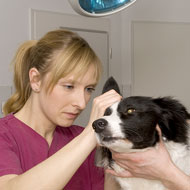Vets sought to help shape future of new graduates

The RCVS is seeking veterinary surgeons working in practice who have an interest in helping new graduates gain the best possible experience.
The Royal College of Veterinary Surgeons (RCVS) is seeking general practitioners to join one of two working groups to help shape a new programme to support veterinary graduates.
In a press release, the College said that it is looking for veterinary surgeons working in practice ‘who have an interest in helping new graduates gain the best possible experience’. It would be beneficial for applicants to have experience with mentoring and/or workplace training, the College said.
“It is incredibly important for us to have input from veterinary surgeons who are working in general practice as they are well-positioned to comment on how the development programme can effectively support graduates on a day to day basis,” commented Sue Paterson, chair of RCVS Education Committee.
The RCVS said the new programme aims ‘to ensure that veterinary graduates are fully supported in their new role and able to progress from day one competencies into confident and capable independent practitioners’. Building on findings from the 2019 Graduate Outcomes Consultation, it replaces the current Professional Development Phase (PDP).
The first of the working groups - the EPA Working Group - will assist in the development of a bank of Entrustable Professional Activities (EPAs) i.e. everyday professional tasks which graduates and their mentors can build into their e-portfolio. The second of the working groups - the Mentor Working Group - will help shape the role of the mentor in the new programme and create a training package for workplace mentors.
Successful applicants will be required to visit the RCVS for three half-day meetings over a year with the RCVS covering travel and subsistence expenses. There will be an additional time commitment to review and feedback on material via email, the College said.
General practitioners interested in applying for should email RCVS education manager Britta Crawford b.crawford@rcvs.org.uk giving a brief description of their current position and why they feel they would be an asset to the working group. Applications close on Friday, 6 March 2020.



 The veterinary mental health charity Vetlife is inviting the veterinary community to join it for a sponsored cold-water dip.
The veterinary mental health charity Vetlife is inviting the veterinary community to join it for a sponsored cold-water dip.